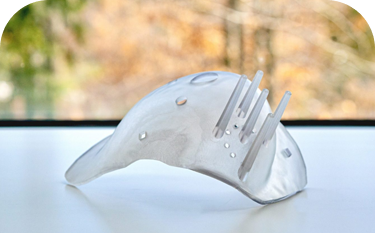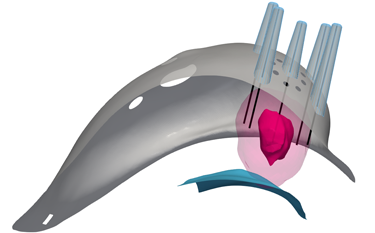Clinical Study to Evaluate System’s Ability to Reduce Positive Margin Rate.
The first patient has been treated in the pivotal clinical trial using the Breast Cancer Locator (BCL) for surgical guidance at Massachusetts General Hospital.
LEBANON, N.H.--(BUSINESS WIRE)--CairnSurgical, Inc., an innovator striving to make breast cancer surgery more precise, announced today that the first patient has been treated in its U.S. pivotal trial of the Breast Cancer Locator (BCL) System at Massachusetts General Hospital. The BCL System is designed to eliminate guesswork in breast cancer surgery by providing a blueprint of the tumor and a surgical guide to achieve clear margins.
“We are committed to participating in clinical research with the potential to improve outcomes for our patients with breast cancer,” said Suzanne Coopey, MD, Massachusetts General Hospital, who performed the first BCL case. “We are very interested in evaluating whether this new approach to guiding the surgeon to tumor margins can make breast cancer surgery more accurate and reduce the need for additional surgery for positive margins.”
Current Breast Conserving Surgery (BCS) is unsuccessful at removing the entire tumor about 20 percent of the time, primarily because current tumor localization techniques do not provide the information required to achieve precise removal of the disease. According to a recent study on breast cancer tumor shapes, less than 20 percent are spherical in shape,1 making techniques that place implants or wires in one or two central points within the tumor of limited to no value in identifying its size, boundaries and margins.
Jennifer Gass, MD, Principal Investigator of the BCL study, Chief of Surgery, Women & Infants Hospital, and Professor of Surgery, Obstetrics and Gynecology, The Warren Alpert Medical School of Brown University, said, “We are very excited to be pursuing this clinical study and this new approach to breast cancer surgery because patients deserve our best efforts to improve clinical outcomes in BCS. We hope this tool will allow us to tailor the surgical resection to the best representation of the patient's own tumor. We have assembled a diverse group of study sites to evaluate the BCL in multiple settings, and look forward to comparing the ability of the technology to affect positive tumor margin, excision volume, and re-excision when compared to standard wire localization.”
The BCL System is designed to reduce positive margin rates, and to improve the process of BCS, using three steps.
-
A supine MRI image is first performed, with the breast positioned in its surgical position, providing detail on the size, shape, depth, edges and 1 centimeter margin for each tumor. This imagery is used to analyze the tumor and construct a three-dimensional tumor model that serves as the basis for two surgical tools.
-
A 3D-printed form – the Breast Cancer Locator, or BCL – is produced to fit the unique shape of the patient’s breast, with ports for several central and bracketing wires to be placed under anesthesia in the operating room immediately prior to surgery. The wires guide the surgeon to the tumor boundaries and margins.
-
An interactive 3D image – the Visualizer – is provided to the surgeon. The Visualizer offers interactive views of the tumor and quantifies the closest distance from the tumor to the skin and chest wall – information that provides valuable references for the surgeon during the procedure.
The Breast Cancer Locator (BCL) Study is a prospective, multicenter, 1:1 randomized, controlled pivotal trial of breast cancer excision surgery in 448 women with non-palpable invasive breast cancer or ductal carcinoma in situ (DCIS) tumors treated at up to 15 U.S. centers. Patients will be randomized to either the BCL or standard wire localization to guide surgery. The primary endpoint is positive margin rate, with other endpoints being specimen volumes, rate of additional shave biopsies, re-excision rate, cancer localization rate, operative time and cost of care.
“Breast cancer surgery today leaves disease in the breast in more than one in five cases – as a surgeon myself, that’s just unacceptable. Re-excision surgery to go back into the breast is bad for the patient - it’s expensive and it’s painful. We developed the Breast Cancer Locator with the vision to provide improved clinical outcomes in order to reduce the positive margin rate. We want surgeons to be able to remove the entire tumor the first time, every time,” said Richard Barth, Jr., MD, Chief of General Surgery, Dartmouth-Hitchcock Medical Center, Professor of Surgery, Geisel School of Medicine at Dartmouth, and Co-Founder, CairnSurgical. “Our pilot studies are demonstrating that, by providing surgeons with a detailed blueprint of the tumor in the supine position, which we have never had before, we can reduce positive margins and enable surgeons to do more precise excisions.”
In a study of the BCL System published in the Annals of Surgical Oncology, clear tumor margins were achieved in all 19 patients.2 Resection volumes were comparable to optimal resection volumes determined by tumor modeling based on the supine MRI.2 A multicenter pilot study of the BCL System currently underway has continued to demonstrate clear tumor margins in every patient.
About CairnSurgical
CairnSurgical, Inc. is a clinical stage medical device company developing patient-specific surgical guides using patient imaging data and state-of-the-art 3D printing technologies. CairnSurgical’s Breast Cancer Locator System enables precise tumor localization and excision, and has been tested in both single arm and randomized clinical trials.
The Breast Cancer Locator is considered an investigational device in the U.S. and is limited by U.S. law to investigational use only. It is not approved for sale in any region.
- Byrd BK, Krishnaswamy V, Gui J, et al. The shape of breast cancer. Breast Cancer Research and Treatment. 2020; 183: 403-410.
- Barth RJ, Krishnaswamy V, Paulsen KD, et al. A patient-specific 3D-printed form accurately transfers supine MRI-derived tumor localization information to guide breast-conserving surgery. Ann Surg Oncol. 2017; 24(10): 2950-2956.




